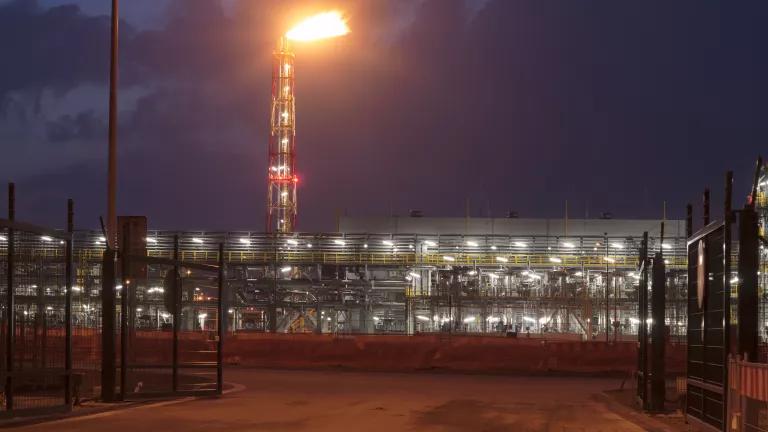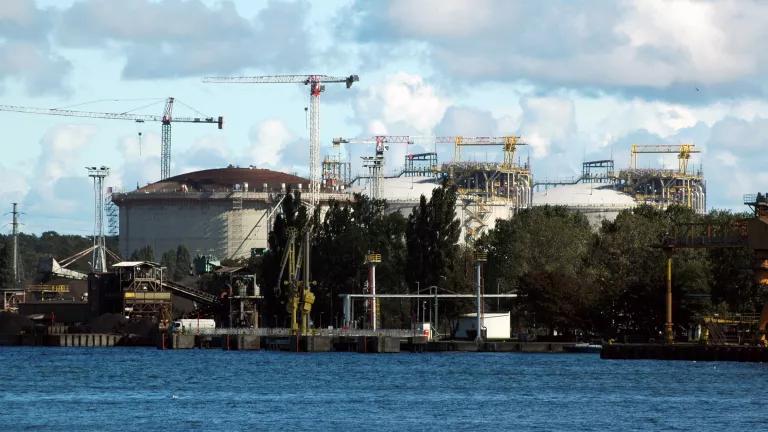Clean Energy Is Key to National Security for European Union and United States
This is a leadership moment for Congress and the White House.

Solar panels at the National Renewable Energy Laboratory’s Flatirons Campus in Arvada, Colorado.
In working to ban Russian oil imports by year’s end, the European Union (E.U.) is tightening its belt to put the squeeze on the Kremlin and its savage attacks on Ukraine.
It’s a bold and substantive move.
Russia is a petro-state that funds about 40 percent of its federal budget from oil and gas sales. E.U. nations get a quarter of their oil from Russia. They’ve paid more than $25 billion for Russian oil just since the invasion of Ukraine began.
Cutting off that revenue stream is the right move—morally and strategically. It will reduce the E.U.’s financial support for Russia’s atrocities and make it harder for Moscow to fund military aggression that threatens the security of Europe.
Later this month, the E.U. will roll out plans to phase out Russian gas and coal as well, completely severing ties with Russian energy sources over the coming years.
The United States must help.
Immediately, that means assisting E.U. nations in finding emergency alternatives to Russian energy supplies, to reduce the hardship the shift imposes on families and businesses across Europe.
Longer term, E.U. nations are committed to slashing demand for fossil fuels altogether, from Russia and elsewhere. That’s core to an E.U. pledge to cut carbon pollution and other greenhouse gas emissions by at least 55 percent, compared to 1990 levels, by 2030.
The United States must do the same, both to help our European allies and to strengthen our own country.
It’s time to break U.S. dependence, once and for all, on the fossil fuels that are driving the climate crisis, holding our families and businesses hostage to global price shocks beyond our control, and padding the Kremlin war chest.
Ending all that is a strategic imperative. It’s an environmental necessity. And it’s an economic opportunity—the economic play, in fact, of our lifetime.
For President Biden and Congress, this is a leadership moment, the moment to stand and deliver on the climate action nearly 7 in 10 Americans expect, that will strengthen the economy, make the country more secure, and help bankrupt the Kremlin war machine.
The best way to advance those goals is to enact the critical clean energy investment package pending in Congress—and enact it now.
Biden moved swiftly to ban U.S. imports of Russian oil in the opening weeks of the war in Ukraine. More than two months of Russian atrocities there have made it clear that we must go further and break free from the tyranny of fossil fuel dependence. We simply can’t continue to support a global oil regime that bankrolls belligerent petro-states like Russia.
U.S. oil dependence has often conflicted with U.S. values, security objectives, and the broader national interest in global stability, based on adherence to international norms, laws, and institutions. It’s long been the great albatross around the neck of U.S. foreign policymakers.
Russia’s petro-aggression has made it clear: that kind of dependence is no longer tenable, in any way, from a strategic perspective. It narrows our options, constrains our effectiveness, and weakens the country, its friends, and its allies.
Nor can we afford to continue relying on a fuel that routinely whipsaws the economy with global price and supply shocks we can’t control or predict.
Phasing out fossil fuels is equally an environmental necessity. Just ask the one-in-three Americans who told Gallup in March that their lives are already being upended by hurricanes, heat waves, floods, and other disasters made worse by the climate crisis.

In 2021, Hurricane Ida’s excessive rainfall caused unprecedented flooding in Philadelphia, as well as other regions along the East Coast.
Last year, wildfires burned enough U.S. land to cover the state of Massachusetts—just part of the extreme weather and climate-related disasters that took 724 lives and cost the country nearly $150 billion in 2021 alone. That’s in addition to the staggering $820 billion in health costs imposed on the country each year by climate change and fossil fuels production.
The 2022 wildfire season has just begun in earnest, burning enough land in New Mexico alone to cover an area nearly the size of New York City, and fires have already charred more than twice as much land as at this point last year.
The American west is baking through its worst drought in 1,200 years. Lake Mead, the nation’s largest reservoir, has fallen to just 30 percent of capacity, the lowest level since it was filled in 1937. And, with Colorado River shortages threatening water supplies for nearly 40 million people, the drought is projected to widen.
All of this, and more, will get worse, as the science makes clear, unless we do as Biden has pledged and cut greenhouse emissions 50 to 52 percent, relative to 2005 levels, by 2030.
We can do that by shifting to cleaner, smarter ways to power our future, a shift that can create hundreds of thousands of jobs in states like Arizona, Michigan, and West Virginia, while helping to position U.S. workers and companies for success in the clean energy marketplace that’s set to attract some $30 trillion in global investment over just the next two decades.
Once enacted, the clean energy and climate package pending in the Senate—some $550 billion in investments and tax incentives over 10 years—will help the country break its dependence on fossil fuels. It will help us get more clean power from the wind and sun, speed the shift to electric cars, make our homes and workplaces more efficient, and build a modern, reliable power grid. It will direct specific benefits to low-income communities and regions historically dependent on fossil fuel production. And, along with rules to clean up our power plants and vehicles, it will cut annual energy costs by $500 per household, on average.
The House has already passed this vital legislation. It’s time for the Senate and the White House to come together and get it done.
Leadership is seldom more important than during a crisis. Russia’s invasion of Ukraine has inflicted a humanitarian crisis, a security crisis, and an energy crisis on the Ukrainian people as well as Europe more broadly and much of the rest of the world.
This is a leadership moment for Congress and the White House. It’s time to enact the critical clean energy incentives we know can help the country move beyond fossil fuels. That’s the way to build real energy security, strengthen the economy, and help starve the Kremlin war machine.



